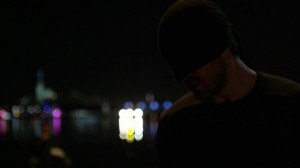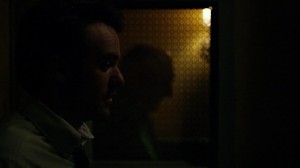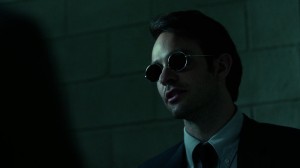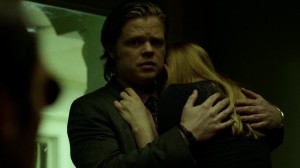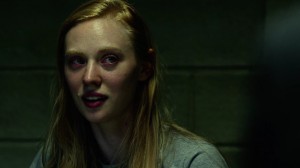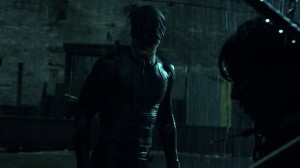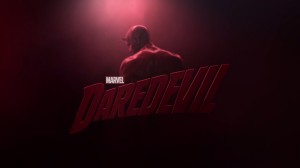 SUMMARY: A slow-boiling beginning sets an enveloping tone for this first-rate vigilante street noir.
SUMMARY: A slow-boiling beginning sets an enveloping tone for this first-rate vigilante street noir.
If you have not seen this episode yet and do not wish to be spoiled, do not continue reading!
Recap
Blind lawyer Matt Murdock and best friend Foggy Nelson open their own practice to aid their neighborhood of Hell’s Kitchen. Their first case is a woman named Karen Page, accused of murdering a man in her apartment. They discover the man was a co-worker helping Karen out with information about illegal fund transfers going through the pension fund of the construction company she works for. This is the activity of an alliance of the heads of various ethnic criminal organizations in the Kitchen. When Karen is nearly killed by a bribed jail guard, Matt realizes she must still have the information the alliance wants.
The same hazardous chemical waste that took Matt’s sight at nine years old supernaturally enhanced his other senses. Coupled with years of physical training, he dons a black suit to take on crime at night. Stopping a shipment for a sex trafficking operation run by the alliance, then saving Karen from an attacker who tries to get the information from her, the Man in Black is suddenly on the alliance’s radar. The Man and Karen turn the information over to the local newspaper, which exposes the scandal.
The construction company, owned by the shadowy, enigmatic Wilson Fisk, reorganizes and hides the money, blaming everything on an accountant who is killed in an apparent suicide. Later, the Russian contingent of the alliance beats a father and kidnaps his son. Matt, dressed in the black suit, hears this through the noise of the city, and goes to work.
For a full recap of this episode, quotes, and trivia, visit our handy episode guide.
Review
It may seem a bit crass to talk about disadvantages when addressing a show featuring a blind lawyer as its main character. We know full well that the loss of a sense is frequently compensated by a reliance on and heightening of the remaining senses, so that, say, a blind person becomes differently abled. This is all, perhaps, an inelegant way to say that this new series’ home on streaming service behemoth Netflix makes it differently abled to succeed beautifully in a way other shows of its ilk cannot or do not. In fact, it’s the broadcast networks, syndication, and basic cable channels that appear at a distinct disadvantage in telling as compelling and mature a story as Netflix allows here.
To be fair, Netflix was proven ground with the successes of House of Cards and Orange is the New Black. Indeed, streaming itself has quickly ascended to viability with award recognition, including an astounding 22 Emmy nominations for Cards‘ first two seasons (with a win for David Fincher in directing), as well as Golden Globes for Robin Wright and Kevin Spacey, and Golden Globes for comedy series and actor Jeffrey Tambor for Amazon Instant Video’s Transparent. The format wasn’t untested, and when Marvel put the bid out and selected Netflix after the challenges and drawbacks of getting Agents of S.H.I.E.L.D. set up at ABC, it wasn’t a gamble but a smart choice. Just how smart is the pudding that has now been proven.
Serial shows can succeed on broadcast; FOX made such a killing on 24 for years that they brought the show back for a limited-run engagement last year to rousing success. Streaming, though, is all but built for it, coming to define the new norm in binge viewing. That plus the removal of restrictions imposed by the nature of broadcast television — free airwaves mean government-imposed sanctions against language, sexuality, and violence at given times of the broadcast day — make Netflix fertile ground to be able to tell the quartet of stories of street-level heroes set in the expansive Marvel Cinematic Universe. These aren’t the flashy guys. These are the heroes down in the muck and mire, and the creative freedom to tell their stories was perhaps the most exciting prospect going in.
What’s most surprising about Marvel’s Daredevil, though, is its pacing. It becomes quite clear that this is the true advantage of the binge nature of Netflix’s model.
For serializing storytelling to work on broadcast or cable channels, the pace of a series needs to be uptempo or risk losing the audience. It’s often pleasantly surprised me that so many people became enamored of AMC’s Mad Men because the movement of the series borders on glacial at points. It’s terrific for fans of character drama who love to see methodical work by actors and writers. Too often, such a thing leaves people by the wayside, especially if they invest in a show spread out over multiple weeks. Would 24 have been as successful if it didn’t have its ever-present clock gimmick and “real time” mantra, as well as drive to thrill the audience with shock twists and propulsive action? And though it’s traded in some episodic format, would Arrow, this series’ most direct comparison, be quite the same without the risks they take on not holding onto plot points?
With Daredevil, there was an expectation that the heroic nature of the source material and the action would push it along, leaving each episode a breathless tug of war between the lawyer and the masked thug taking it to other thugs. Yet, this first hour makes it abundantly clear that the show is far more interested in the advantage it has with time to really let us into its characters and to immerse us in the unsavory world of Hell’s Kitchen. This is a place that doesn’t let us forget it exists in a world with gods, monsters, aliens, and colorful heroes, but is a decidedly different milieu filled with just as immediate and pressing danger and an ever-present haze of abject predetermination. The Battle of New York, here referred to as “the Incident,” might have occurred in the skies over Hell’s Kitchen, but it feels a world away from this tucked away dark corner.
Funny enough, the show kicks off in quick fashion with an effective opening sequence that shorthands the origin of Matt Murdock’s abilities, It does so without any particular context, just the flash of a father in media res helplessly trying to get to his hurt child, and that boy freaking out as his selfless act takes the visual world from him. It’s the quickest thing in the hour, and you know from the start that the show isn’t going to hold your hand.
Abruptly, the show hits the brakes and that slow build is immediately felt in an entrancing introduction to the present day Matt, explaining to a priest why he needs absolution for the path he is about to take. If there was any concern or just plain question about relative lesser-known Charlie Cox (Stardust, Boardwalk Empire, The Theory of Everything) and his ability to hold the screen as a lead and carry the part, it’s all masterfully addressed in a nearly five-minute monologue that encapsulates Matt’s love for his father, the drive and passion for his new mission, his faith, and a reluctant acceptance of his duality. “Duality” used loosely here because one of the things both Cox and the show nail is that the Man in Black is an extension of Murdock. He wears the mask merely to keep his identity from stopping his crusade.
Otherwise, there’s nothing distinctly different between the two. He doesn’t carry himself different, other than keeping up the ruse of the expected behaviors of a blind person during the day. He doesn’t even affect an altered voice, which makes it surprising that Karen Page doesn’t recognize him instantly when she comes face to face with her protector. Perception, that people would never believe a blind person capable of such acts — the Man in Black appears fully sighted, even if his mask completely covers his eyes — is really the one thing that properly shields him from suspicion.
While there are certain to be shots completed by his stunt double, Cox brings a superb physicality to the role that makes him feel alternately like a boxer in the Murdock family vein and quite feral feline. The black body-hugging material at times feels like the dark sinew of a panther, particularly doused in the rain of the latter night of the episode, and he moves with a measured grace in everything until the moments he unleashes the fury of his fists. Cox also has a way to seem slight when dressed in Murdock’s suits during the day that effectively hides his strength and musculature. They obviously don’t hide that Matt is an attractive man, but the costuming and Cox’s unassuming nature in it belie this terse punctuation of a fighter underneath. Usually, you run into the thing where Clark Kent still has the bulk and physique of Superman in his day-to-day clothes, even as he tries to be a klutz or a wallflower or a regular guy. Here, Cox is much more convincing.
Beyond that, there is an eerie calm to him and his mannered speech that’s supposed to mask that Murdock rage that wells deep within him. It offers an assuredness that butts up joyfully against the hectic mess that is Foggy Nelson. It also grants him an affability that makes him a charming lead, makes Matt a soul to get behind, and clearly informs why women would be into both actor and character. It’s a superb piece of casting, and this exposure is sure to up his presence in Hollywood in the near future.
Speaking of Foggy, Elden Henson has probably the trickiest role in the opener, if not the series. There’s a natural tendency with Foggy to make him the comic relief, and they don’t entirely shy away from that. Beyond that, he’s supposed to represent both the normalcy of Matt’s life as well as the legal side of it. It’s a part and performance that’s sure to be a bit of a lightning rod for people. Overall, he’s played a bit broad and Henson’s approach is a bit breathy, and it’s not difficult to see how it might turn some people off. There is an earnestness to Foggy, though, that makes him endearing. They give him the traditional foible of wanting to be in business to make money, but there’s a teddy bear quality to Henson that gives Foggy a warm heart.
One can see the idealist hiding beneath the surface, and it’s ultimately Foggy’s good guy-ness — the sturdy rock he provides Karen at the moment she breaks down and he gives her a hug — that makes him a worthwhile presence. He complements Matt well, and that’s worth gritting through some of the strained stabs at levity and quirkiness. Plus, he provides a great dejected expression any time Matt starts talking to a woman in his presence and she responds. Terrific bit of history in a movement.
What turns out to be the stand-out performance of the hour belongs to Deborah Ann Woll. It’s an arc of high emotion as Karen Page is run through the ringer after being accused of murder and realizing that, while she didn’t personally kill the man from work, what she discovered and told him about directly contributed to his death. I wasn’t quite sure what to expect of Karen for the series. She had devolved into such a tragic and toxic character in the comics before eventually getting killed off, so it wasn’t clear quite how they were going to explore her in the show. Making her Matt and Foggy’s first client and intimately, if unknowingly, tied into the business of the criminal alliance was a shrewd decision. She is integral to the story, not just another character to write for.
One of the best compliments or critiques an actor can receive is that they’ve acquitted themselves with a rawness and authenticity that makes them feel like a genuine person. Woll’s strong ability to be present in the moment actively sells not only the stakes of her situation but of the entire series. It’s the “in” to the larger criminal conspiracy, demonstrates the potential danger to her life, and has to put that group on the defensive, inciting the main thrust of the season.
As much as they needed to get Matt Murdock perfect, it turns out Karen Page was as vital. They got her right.
The whole cast is dead-on. As Marvel’s frequent superb casting goes, this might be their crowning achievement. From top to bottom, everyone fits. From the dirty detectives, to the unamused priest, to the different heads of each of the criminal organizations, to young Matt and his guy in a bad situation father, on down to the multitude of denizens populating Hell’s Kitchen. The show doesn’t have to find its world, its atmosphere, its fabric. It’s born fully-formed and there’s a wonderful sense of pulp, a clear base ingredient of this broody stew.
A highlight amongst them is Toby Leonard Moore as the “employer’s” right-hand man, James Wesley. Wesley in the comics and the 2003 movie came across weaselly, but here he’s the most confident and competent person in the room in any room he’s in. As eerie as Cox’s calm can be for Murdock, Moore’s is just as effective and menacing. It’s another in a series of smart choices, especially given that they keep his boss, Vincent D’Onofrio’s Wilson Fisk, in the shadows off-screen for this hour save for a brief voice cameo near the end. Fisk’s presence can be felt in his absence, but his reach needed to be personified, and Moore provides the perfect face and performance for that.
Adding to that feel of an established and lived-in world with no training wheels, it’s very appreciated that they didn’t take a significant amount of time explaining how Matt is able to interact with the world through the de facto “sight” of his heightened senses. They don’t outright neglect it, giving us visual and context clues about echo-location and allowing us to fill in some blanks with the chemical waste that was splashed on his eyes as a child. In the Affleck film, they spent a good chunk of time explicitly demonstrating the “radar” sense built by his advanced hearing, as well as his use of a sensory deprivation tank to be able to sleep at night. Most would assume a pilot would offer something similar in its set-up of the premise, characters, and world. Here’s where the Netflix model advantage takes center stage again. Not concerned with selling the show, they can push information like that, allowing it to be shown over time.
For those in the know, we get straight to the story. For the uninitiated, it sets up a mystery to be explored as the show progresses.
“Into the Ring” is a gorgeous beginning to a fascinating series. It introduces all of the essential pieces without feeling like it gives away the store, as can often happen with a pilot. As an adaptation, the show respects its characters and source material, as well as the complex machinery of the Marvel juggernaut. It never once feels weighed down by that responsibility nor any of its elements. It is a very assured venture, and that awareness allows it to take its time telling its story and live by its characters. More important, it’s smart and enjoys its audience for being so. It rewards us with a dark, violent, captivating study of a man working on the edge to help his people.



